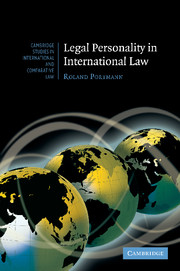Book contents
- Frontmatter
- Contents
- Foreword
- Acknowledgments
- Table of Cases
- List of Abbreviations
- Introduction
- Part I The concept of personality in international law
- Part II The conceptions of personality in international law: their origins and legal manifestations
- 4 Early doctrine and practice
- 5 The states-only conception
- 6 The recognition conception
- 7 The individualistic conception
- 8 The formal conception
- 9 The actor conception
- Part III A framework for personality in international law
- Bibliography
- Index
- Titles in the series
- References
4 - Early doctrine and practice
Published online by Cambridge University Press: 05 October 2010
- Frontmatter
- Contents
- Foreword
- Acknowledgments
- Table of Cases
- List of Abbreviations
- Introduction
- Part I The concept of personality in international law
- Part II The conceptions of personality in international law: their origins and legal manifestations
- 4 Early doctrine and practice
- 5 The states-only conception
- 6 The recognition conception
- 7 The individualistic conception
- 8 The formal conception
- 9 The actor conception
- Part III A framework for personality in international law
- Bibliography
- Index
- Titles in the series
- References
Summary
It is with Emer de Vattel's textbook of 1758 that international law came to be conclusively shaped as a law between states. According to Vattel, international law was applicable to states and to a certain extent, though not exclusively, created by states. Before Vattel, international law had been a fusion of pre-existing rules, complemented to a certain degree by human-made law, being applicable to rulers of nations, to corps of citizens and to private individuals. After Vattel's treatise, until the end of the nineteenth century, international law was in principle, though not exclusively, regarded as inter-state law, the debate mostly focusing on the means of creation of international law and its status as law. In what follows, approaches regarding the personal scope of international law preceding Vattel will be reviewed first. Subsequently, Vattel's conception of international law as inter-state law and the broader origins of this view will be outlined. Finally, the doctrinal and practical developments with respect to the personal scope of international law taking place after Vattel until the mid nineteenth century will be explored.
Before Vattel: international law as an all-embracing web of laws
One of the first to describe international law as a law between ‘nations’ was Hugo Grotius in his De Jure Bellis ac Pacis in 1625. By using the term ‘law of nations’, however, Grotius did not envisage a law between states.
- Type
- Chapter
- Information
- Legal Personality in International Law , pp. 31 - 41Publisher: Cambridge University PressPrint publication year: 2010



